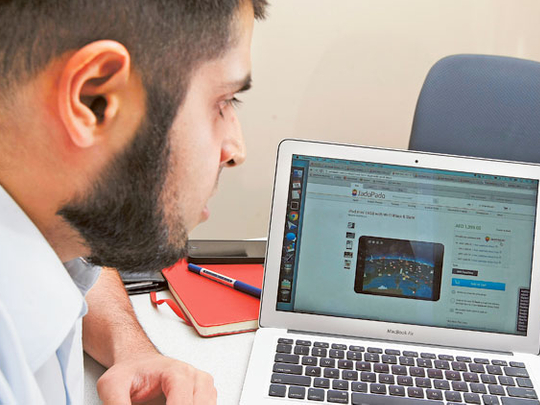
Dubai: The formula for a successful e-commerce site, in the Middle East or elsewhere, is simple: combine fast delivery, stock availability, and product variety under one roof, says Omar Kassim, founder of JadoPado, an online retail site based in the UAE.
Founded in 2010, the $4 million business sells and delivers gadgets and electronic goods to customers in the UAE, the GCC and beyond, to 160 countries worldwide.
Over the last several years, businesses entered and left the e-commerce space. What they lacked “is sustainability in the medium and long term,” Kassem said. Some have failed to tailor their offerings to meet the demand of local consumers, while consumers barely bought online.
But he says the market is poised for further growth with the entry of new players.
The region’s e-commerce market — valued at around $9 billion — is small compared to the offline retail market, which is estimated to be worth $425 billion. By 2015, e-commerce is expected to be worth $15 billion.
The larger number of e-commerce sites in the region today is credited to a number of factors, which are partially related to the changing consumer habits.
These include higher use of internet-enabled devices, such as smartphones and tablets.
The higher internet penetration has led to an increase in online credit card transactions.
Additionally, consumers that want to buy a product are looking for a bargain. Online stores can offer it to them better deals compared to offline retail outlets, he explained.
Buying online
Although some consumers may hesitate to buy online due to fear of online fraud, Kassem says it’s safe.
“Consumers are afraid of transacting online with a company they don’t now. Instilling trust in consumers is important,” he said.
Sixty per cent of transactions on JadoPado are done online by credit card, while 40 per cent are via cash on delivery.
Kassim says the cash on delivery option can hinder the sustainability of a business. JadoPado offers cash on delivery only to customers in the UAE.
“Cash on delivery creates added costs. You pay for shipping fees [to send out the product]. When you put it in a warehouse after it’s returned, you pay for storage fees, then you pay for shipping again when you import it back into the country,” he said.
He added that many consumers in the region tend to return a product after paying for it on delivery. The rejection rate in Saudi Arabia stands at 40 per cent, he said.
Delivering a product to a location in the UAE can take between three to four hours. In the GCC, that takes between three to four days, but in some cases, delivery is done overnight.
Meanwhile, commenting on buying trends, Kassim said consumers tend to visit offline retail outlets to see and touch a product before buying it online. Others read online product reviews before an online purchase is done.
“People prefer to buy online instead of going to the mall. It’s just more convenient. Malls are for experiences, not necessarily for shopping,” he said.
New service
JadoPado is offering the recently launched JadoPado Shield, which is a protection plan that covers the cost of damages done to a product, be it from accidental falls or unauthorised usage. Consumers can get the service with different kinds of products without paying an extra price. They can also buy the service upgrade options at various prices, ranging from Dh50 to Dh100, with coverage for up to three years.











